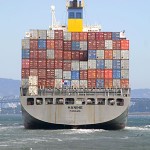Obama's Missing Trade Stimulus
 As China and Russia expand their trading relationships around the world, the White House has been silent on finding ways to boost American exports.
As China and Russia expand their trading relationships around the world, the White House has been silent on finding ways to boost American exports.
In light of the depressing numbers released this week, it is well past time to ask: What happened to the Summer of Recovery? We have heard enough about the failures of the Obama administration with respect to economic policy – spiraling deficits and unemployment well above the promised 8%. The real question is not even why, but what would a GOP administration do differently. The answer lies in history.
After WWII, the normal postwar depression didn’t happen. Many factors contributed to this, but undoubtedly the trade-enhancing Bretton Woods agreement and the Marshall Plan were critical. Likewise, the stagnation of the 70’s ended not only because of Reagan’s marginal tax cuts, but also the Anglo-American loosening of capital flows and other trade policies. The recession of the early 90’s gave way to NAFTA and the heyday of globalization.
In economics finding direct causation is a fool’s errand, but there is a clear pattern of trade expansion going with economic recovery (and retrenchment leading to extra misery). Lower tariffs and elimination or simplification of other barriers on the international level perform the same task as lower taxes and deregulation on the domestic level.
So what is the Obama trade agenda? To his credit we have not seen Smoot-Hawley protectionism, but neither have we seen any efforts to expand trade. Deals with South Korea and Columbia have been put on ice. The Free Trade Area of the Americas is all but dead. Little wonder the Summer of Recovery has been lukewarm.
The effects extend beyond the economy. China is making inroads into South America via trade. Russia is reasserting hegemony over Eastern Europe. Meanwhile, the administration has shown its contempt for trade and public diplomacy by appointing a political hack to run the U.S. Trade Representative’s office in Geneva.
As part of a broad recovery agenda, Republicans must include a new push for expanded trade. This is not a call for unilateral disarmament – ending our own trade protections without reciprocity - but rather a call for making the Trade Rep’s office relevant. New treaties that reward allies and boost exports are good for the economy and good for our standing in the world.
To date, Obama has been practicing defensive economics – bailouts and “stimulus” designed to avert disaster and save jobs. Now is the time to go on offense, growing the economy and creating jobs.